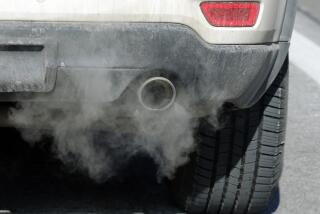Firm’s Chips Fuel Vehicle Performance
- Share via
Most people have some inkling these days of how to use and improve their desktop and portable computers. Few, however, dare tackle the automotive computers that have grown increasingly complex since first introduced in the early 1980s.
But just as PC users can buy software to soup up computer performance, savvy motorists can buy software to soup up the performance of their vehicles.
Performance chips can be found in a variety of auto parts and performance shops, ordered from ads in automotive publications or purchased direct from the factories via the Internet.
One player in this unusual niche in the high-tech world is JET Performance, a Huntington Beach company that began 31 years ago as a carburetor tuning shop and has evolved into a leader in the performance chip industry.
Under-the-hood computers were introduced in 1981 as the auto industry sought ways to fine-tune engines to comply with increasingly strict pollution and fuel consumption rules.
The first computers were simple chips programmed to control the timing of the spark that ignites the fuel-air mixture in each cylinder of an engine.
But as engines and fuel systems became increasingly complex, so did the computers that control them. Engine management systems nowadays control ignition timing, the ratios at which air and fuel are mixed, engine speed and the shift points for automatic transmissions.
The central processing unit for an engine management computer in a 1981 Ford probably had 300 lines of code programmed into it, said Dan Nicholas, operations manager at JET. Most systems today have 14,000 or so lines of code, and the numbers increase yearly.
JET, which stands for Jones Electronic Technologies, got into computer tuning after Bryant Seller bought the company from founder Mike Jones in 1985. A computer enthusiast, Seller saw that the performance tuning business was going the way of the Dodo bird as electronic control units--EPUs--replaced conventional mechanical components.
Retuning the EPUs to improve factory settings, he figured, would be the new way to go.
So he got together with several friends and devised a way to suck the factory-installed code out of a vehicle’s on-board computer, read it and re-engineer it. He also made sure that the chips JET makes for general use were certified by the California Air Resource Board for use under the state’s stiff smog laws. And, properly installed, the chips do not void a new car warranty.
JET, which claims a 40% share of the market--its biggest competitor is Hypertech Inc. in Memphis, Tenn.--sells chips that plug into and modify the EPUs of most domestic and many older import cars and trucks.
Most newer imports have computers that must be erased and reprogrammed in the shop, a process requiring owners to park their vehicles for a couple of days and ship the computers to JET or one of its competitors.
Nicholas said most of the company’s chips are bought by owners of pickup trucks and sport-utility vehicles--people who haul or tow heavy loads and want the extra power.
But that’s a big part of the market, and JET’s sales have grown from less than $1 million a decade ago to $8 million last year. The company is shooting for $10 million this year, he said.
*
John O’Dell covers major Orange County corporations and manufacturing for The Times. He can be reached at (714) 966-5831 and at john.odell@latimes.com.





